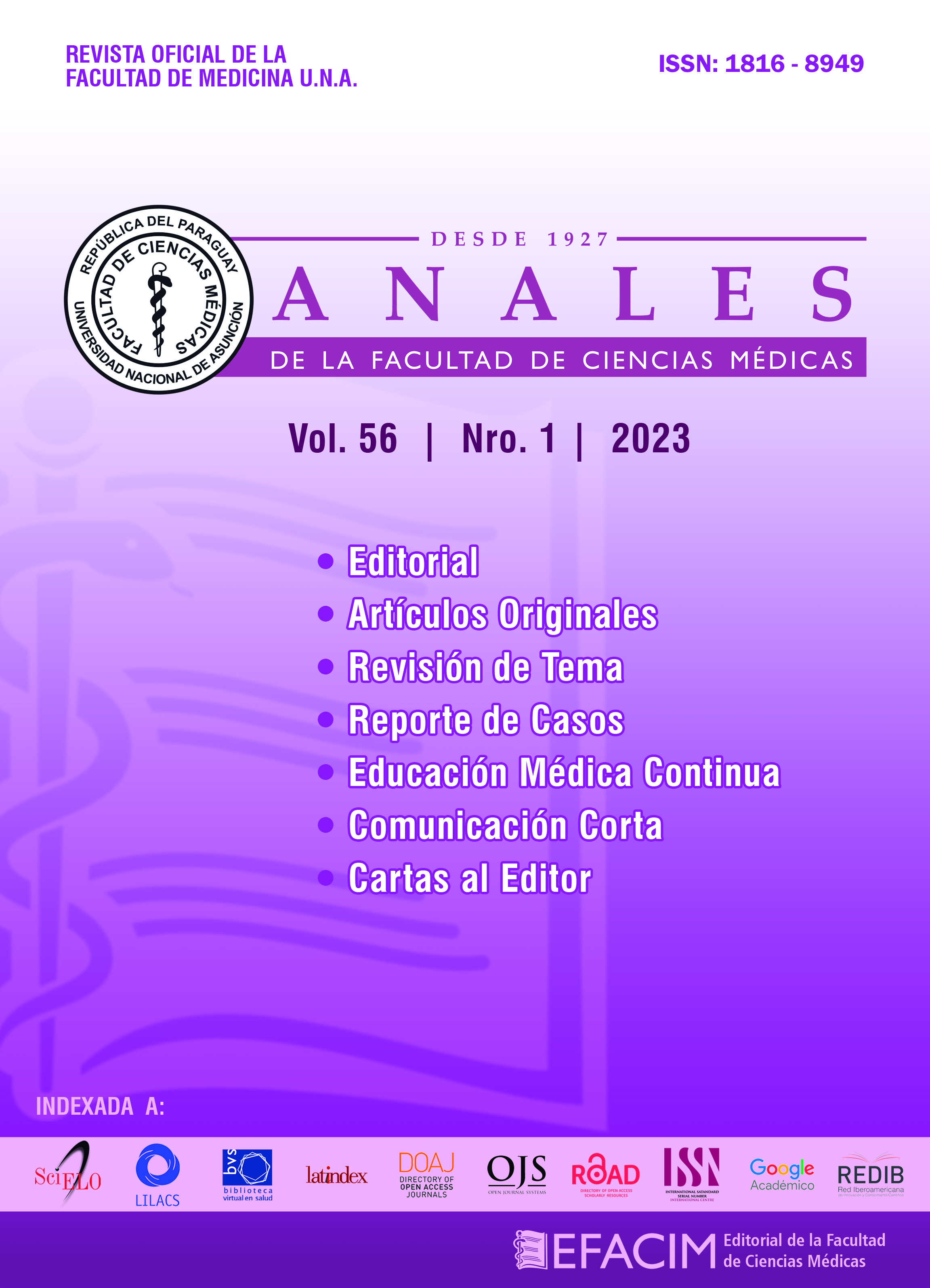Aceptación, rechazo y vacilación a recibir la vacuna contra COVID-19: estudio multicéntrico
Palabras clave:
COVID-19, vacunas, negativa a la vacunación, encuestas y cuestionariosResumen
Objetivos: Determinar la predisposición a recibir esta vacuna contra SARS-CoV-2.
Materiales y métodos: Se aplicó un diseño observacional de corte transversal en la población adulta del Paraguay entre mayo y octubre 2022. se aplicó el cuestionario de Kotta et al previamente validado, el cual fue difundido por redes sociales.
Resultados: Se incluyeron 303 encuestados, con edad media 34 ± 12 años y predominio del sexo femenino (64,0%). En la muestra, 51,8% padeció COVID-19 y 97,3% ya recibió al menos una dosis de la vacuna. Se detectó que 58,4% aceptada la vacuna, 17,8% vacilaba en recibirla y 23,7% la rechazaba. La aceptación fue más frecuente en los varones (p 0,05).
Conclusión: En el momento epidemiológico de disponibilidad universal de la vacuna y habiendo aún sujetos afectados por COVID-19, el rechazo a la misma fue 23,7%.
Referencias
Alshurman BA, Khan AF, Mac C, Majeed M, Butt ZA. What demographic, social, and contextual factors influence the intention to use covid-19 vaccines: A scoping review. Int J Env Res Public Heal. 2021;18(17):9342. https://doi.org/10.3390/ijerph18179342
Liu Q, Qin C, Liu M, Liu J. Effectiveness and safety of SARS-CoV-2 vaccine in real-world studies: a systematic review and meta-analysis. Infect Dis Poverty. 2021;10(1):132. https://doi.org/ 10.4103/jehp.jehp_327_21
Shaukat A, Hussain K, Shehzadi N. COVID-19 vaccines: Development, strategies, types and vaccine usage hesitancy. Vaccimonitor. 2021;30(3):145–52. Disponible en: http://scielo.sld.cu/scielo.php?script=sci_arttext&pid=S1025-028X2021000300145&lng=es.
Biswas MR, Alzubaidi MS, Shah U, Abd-Alrazaq AA, Shah Z. A scoping review to find out worldwide Covid-19 vaccine hesitancy and its underlying determinants. Vaccines (Basel). 2021;9(11):1243. https://doi.org/ 10.3390/vaccines9111243
de Albuquerque Veloso Machado M, Roberts B, Wong BLH, van Kessel R, Mossialos E. The relationship between the COVID-19 pandemic and vaccine hesitancy: A scoping review of literature until August 2021. Front Public Heal. 2021;9:747787. https://doi.org/ 10.3389/fpubh.2021.747787
Shen X, Dong H, Feng J, Jiang H, Dowling R, Lu Z, et al. Assessing the COVID-19 vaccine hesitancy in the Chinese adults using a generalized vaccine hesitancy survey instrument. Hum Vaccines Immunother. 2021;17(11):4005–12. https://doi.org/ 10.1080/21645515.2021.1953343
Eberhardt J, Ling J. Predicting COVID-19 vaccination intention using protection motivation theory and conspiracy beliefs. Vaccine. 2021;39(42):6269–75. https://doi.org/ 10.1016/j.vaccine.2021.09.010
Kotta I, Kalcza-Janosi K, Szabo K, Marschalko EE. Development and validation of the multidimensional COVID-19 vaccine hesitancy scale. Hum Vaccin Immunother. 2021;1–10. https://doi.org/ 10.1080/21645515.2021.2007708
Herrera-Añazco P, Uyen-Cateriano A, Urrunaga-Pastor D, Bendezu-Quispe G, Toro-Huamanchumo C, Rodríguez-Morales A, et al. Prevalencia y factores asociados a la intención de vacunarse contra COVID-19 en el Perú. Rev Peru Med Exp Pública. 2021;38(3):381–90. https://doi.org/ 10.17843/rpmesp.2021.383.7446
Montiel-Jarolin D, Samudio M. Vacunación contra el COVID-19 y causas de rechazo a la vacuna en el Paraguay. Rev salud publica Parag. 2022;12(1):5–12. https://doi.org/ 10.18004/rspp.2022.junio.05
Rios-González CM, Mendez J, Estigarribia G, Aguilar G, Martínez P. Efectos secundarios de las vacunas anti COVID-19 en personal de salud de Paraguay: estudio exploratorio. Rev salud publica Parag. 2021;11(2):24–9. https://doi.org/ 10.18004/rspp.2021.diciembre.24
Aw J, Seng J, Seah S, Low L. COVID-19 vaccine hesitancy — A scoping review of literature in high-income countries. Vaccines (Basel). 2021;9(8):900. https://doi.org/ 10.3390/vaccines9080900
García-Villaseñor E, Bojalil-Álvarez L, Reyes-Cisneros OA, Fernández-Gutiérrez JA, Sánchez-Bonilla D, Robles-Nasta M, et al. SARS-CoV-2 vaccination patterns in a private hematology and internal medicine outpatient clinic. Salud Publica Mex. 2022;64(5):464–70. https://doi.org/ 10.21149/13549
Wong LP, Lin Y, Alias H, Bakar SA, Zhao Q, Hu Z. COVID-19 anti-vaccine sentiments: Analyses of comments from social media. Healthc (Basel). 2021;9(11):1530. https://doi.org/ 10.3390/healthcare9111530
Joshi A, Kaur M, Kaur R, Grover A, Nash D, El-Mohandes A. Predictors of COVID-19 vaccine acceptance, intention, and hesitancy: A scoping review. Front Public Heal. 2021;9:698111. https://doi.org/ 10.3389/fpubh.2021.698111
Kashif M, Fatima L, Ahmed AM, Arshad Ali S, Memon RS, Afzal M, et al. Perception, willingness, barriers, and hesistancy towards COVID-19 vaccine in Pakistan: Comparison between healthcare workers and general population. Cureus. 2021;3(10):e19106. https://doi.org/ 10.7759/cureus.19106
Goffe L, Antonopoulou V, Meyer CJ, Graham F, Tang MY, Lecouturier J, et al. Factors associated with vaccine intention in adults living in England who either did not want or had not yet decided to be vaccinated against COVID-19. Hum Vaccin Immunother. 2021;1–13. https://doi.org/ 10.1080/21645515.2021.2002084
Ochoa Quispe FZ, Barragán Condori M. El uso en exceso de las redes sociales en medio de la pandemia. Acad (Asunción). 2022;9(1):85–92. https://doi.org/ 10.30545/academo.2022.ene-jun.8
Delgado-Gallegos JL, Padilla-Rivas GR, Zúñiga-Violante E, Avilés-Rodríguez G, Arellanos-Soto D, Gastelum-Arias LJ, et al. Determinants of COVID-19 vaccine hesitancy: A cross-sectional study on a mexican population using an online questionnaire (COV-AHQ). Front Public Heal. 2021;9:728690. https://doi.org/ 10.3389/fpubh.2021.728690
Dana R, Usman E, Katar Y, Sari N. Acceptance of COVID-19 vaccination and correlated variables among global populations: A systematic review and meta-analysis. Clin Epidemiol Glob Heal. 2021;12:100899. https://doi.org/ 10.1016/j.cegh.2021.100899
Eibensteiner F, Ritschl V, Nawaz FA, Fazel SS, Tsagkaris C, Kulnik ST, et al. People’s willingness to vaccinate against COVID-19 despite their safety concerns: Twitter poll analysis. J Med Internet Res. 2021;23(4):e28973. https://doi.org/ 10.2196/28973.





